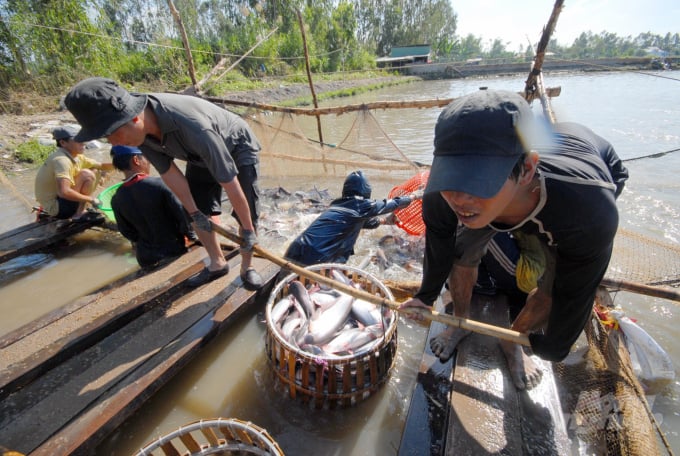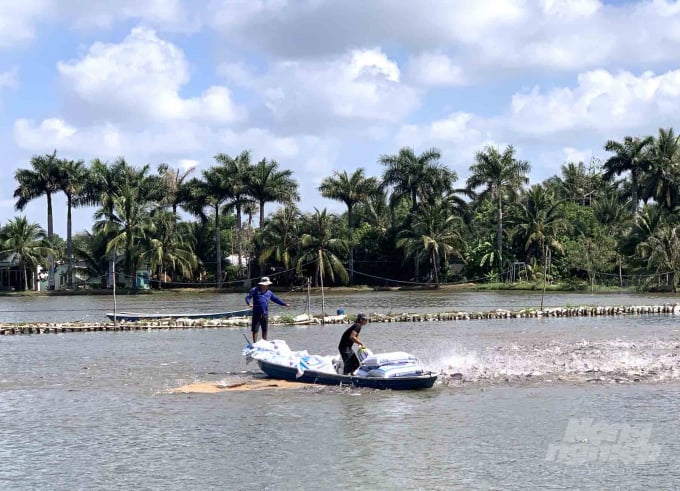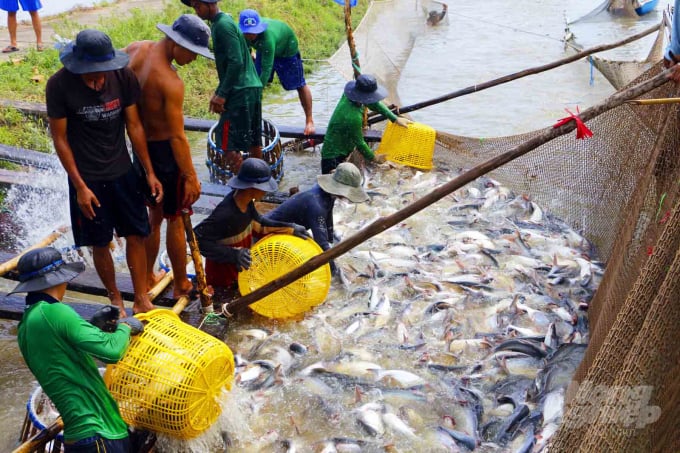May 28, 2025 | 19:29 GMT +7
May 28, 2025 | 19:29 GMT +7
Hotline: 0913.378.918
May 28, 2025 | 19:29 GMT +7
Hotline: 0913.378.918

Men harvest tra fish in the Mekong Delta region. Photo: LHV.
Tra fish raised in the Mekong Delta region is identified as a key export product of Vietnam. Despite tough competition, Vietnam’s tra fish export has been growing stronger.
In the last three years, the Mekong Delta region has seen an alarming reduction of river water during dry seasons as visible negative impacts of climate changes. The COVID-19 pandemic also affected the tra fish consumption.
Tra fish farmers in the Mekong Delta region had to adjust their production and seek measures to respond to challenges caused by climate change and the COVID-19 pandemic.
Notably, Vietnamese fishery firms gave priority to complete value chains and ensure food safety for sustainable development.

A tra fish farm in Con Son, Can Tho City. Photo: HD.
For years, Bien Dong Seafood Ltd Company for years has been applying a close process from tra fish breeding, feeding, farming and processing. It is known as one of two leading tra fish producers, processors and exporters in the Mekong Delta region of Vietnam.
The US imposed inspection to all Vietnamese tra fish from Vietnam since August 2017. The US’s Foof Safety and Inspection Service (FSIS) directly arrived at tra fish farms and processing factories in the Mekong Delta region to examine and assess the food safety control system. The FSIS then certified that the food safety control system in tra fish production, process and export in Vietnam meet the US’s regulations.
Ngo Quang Truong, Director of Bien Dong Seafood Ltd Company said that only high-quality tra fish could enter the US market.
His company strictly controlled banned substances and antibiotic residues in products, he said.
Thanks to good quality control, the company’s products could meet the requirements of demanding markets like the US, he said.
The US, China and EU are major importers of Vietnamese tra fish. As some importing markets are recovering from the COVID-19 crisis, Vietnamese tra fish farms in Mekong Delta region say that they are preparing for production resumption to actively catch up with post-pandemic market moves.
Until now, all ten localities with tra fish farming zones in the Mekong Delta region implemented measures to prevent/control diseases and improve the quality of the tra fish.
The Directorate of Fisheries and the Mekong River Commission conducted environmental observations at upstreams of the Mekong River. Meanwhile, localities are responsible for observing the environment in farming zones, establishments are responsible for observing the environment at fish-raising ponds.
According to the Directorate of Fisheries, now the tra fish farming areas in the Mekong Delta region have made progress.
First of all, in the production of breedings, in 2019, the region had 200 establishments producing tra fish breedings and 3,000 ha of raising fish breedings, producing about 21 billion larval fish and more than 2.1 billion breedings.
In terms of input factors control, all industrial feed production establishments have been tested and certified to meet production and business conditions. All farming establishments use industrial feed.
All processing enterprises have their own commercial tra fish farming areas or buy raw materials from processing establishments or chain-linked farms.
All farms are controlled on food safety under food safety law, of which, 70 per cent of the farming area is certified to meet domestic/international quality control standards (1,900 ha applied VietGAP, about 2,000 ha is certified to meet ASC, Naturland, GlobalGAP and BAP).
As many as 4,860 fish raising ponds were granted identification codes and management software that enable origin traceability.
Tran Anh Thu, Vice-chairman of An Giang Province People’s Committee said that tra fish industry faced difficulties in recent years and tra fish farmers suffered losses a lot.
From the beginning of this year, due to the COVID-19 pandemic, tra fish prices dropped.
Currently, tra fish is sold at about VND 21,500-22,000 per kilo while the production cost is about VND22,000-23,000 per kg.
To overcome difficulties and develop tra fish industry, An Giang Province has been boosting linkage in breeding production among Aquaculture Research Institute 2, the province’s Aquaculture Breeding Centre and breeding production groups.
The province authorities also attracted four investors to concentrated hi-tech farming areas including Việt Úc Group with 104 ha, Nam Viet Ltd Company with 600 ha, Vinh Hoan Joint Stocks Company with 48,3 ha and Loc Kim Chi Ltd Company with 350 ha.
Their investment in breeding projects will help improve the quality of tra fish breedings in the coming time.
Nam Viet Group has been applying large scale hi-tech in tra fish farming for years. Its breeding project covering an area of 600 ha with a total investment of VND 4 trillion is implemented in three hamlets – Binh Duc, Binh Quoi and Binh Thoi – in Binh Phu Commine, Chau Phu District.

Linkages have been promoted in tra fish farming in the Mekong Delta region. Photo: NVC.
The group invested VND 1 trillion to raise high-quality breedings in the area of 150 ha. About 360 million high-quality tra fish breedings are produced yearly, to supply to domestic tra fish farms and export.
Other VND 3 trillion was invested on its hi-tech aquaculture farm which produced 200,000 tonnes of raw tra fish yearly. The raw tra fish would be processed for export.
Vinh Hoan Joint Stocks Company based in the southern province of Dong Thap also opened a breeding production subsidiary in An Giang Province. It targeted to supply 1.6 billion fry fish and 30 million breeding fish yearly.
Vinh Hoan Company is also building a feed production plant with a capacity of 350,000 tonnes per year and an organic fertiliser production plant.
Waste from tra fish farms will be collected and treated to make organic fertilisers. The company’s circular economic model is said to be very promising.
/2025/05/25/4127-3-073637_820.jpg)
(VAN) Thanks to the promotion from an FAO-implemented project, vegetable production in greenhouses in Moc Chau has seen strong development, from 1.5 hectares in 2021 to nearly 50 hectares in 2024.

(VAN) FAO has recently supported USD 140,000 to implement the project 'Risk mitigation human-animal interface risks through disease control initiatives in pig farming.'

(VAN) The People's Committee of Tra Vinh province has approved an adjustment to the investment policy for the Green Hydrogen Plant project, increasing its area to approximately 52.76 hectares.
![Reducing emissions from rice fields: [2] Farmers’ commitment to the soil](https://t.ex-cdn.com/nongnghiepmoitruong.vn/608w/files/news/2025/05/05/dsc08881jpg-nongnghiep-140632.jpg)
(VAN) Clean rice cultivation model in Thuong Tan commune, Bac Tan Uyen district, is assisting local residents in achieving sustainable agriculture by substantially reducing costs, increasing productivity, and protecting the environment.

(VAN) At the conference to disseminate Resolution No. 68, AgriS introduced its digital agricultural ecosystem and reaffirmed its commitment to accompanying the Government in promoting private sector development and sustainable agriculture.

(VAN) 'Blue Ocean - Blue Foods' initiative is designed to restore marine ecosystems and establish sustainable livelihoods for local communities by cultivating a minimum of 1,000 hectares of cottonii seaweed in the first three years.
/2025/05/21/4642-3-112707_603.jpg)
(VAN) The V-SCOPE project has made direct contributions to three out of six pillars of the Comprehensive Strategic Partnership between Vietnam and Australia.